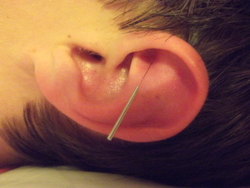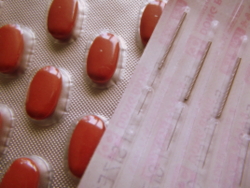A clinical trial in London has shown the feasibility and usefulness of providing acupuncture within a busy NHS radiotherapy unit. A total of 101 cancer patients were randomised to receive either standard care in the unit, or standard care plus acupuncture. The latter was given to assist with common symptoms such as fatigue, nausea, vomiting, hot flushes, mood and sleep problems. Patients were given between three and eight acupuncture treatments, one week apart.
Patients reported qualitatively that they valued the positive impact acupuncture had, with improvements in fatigue, nausea, vomiting, pain, insomnia and shortness of breath being noted. Quantitatively, only improvements in fatigue were identified.
(A feasibility trial of acupuncture in cancer patients undergoing radiotherapy treatment. Complementary Therapies in Clinical Practice, May 2021.)

 An American team, part funded by the US Government’s National Institutes of Health, has shown that acupuncture for chemotherapy-induced peripheral neuropathy, offers significant improvements over usual care. The pilot randomised trial recruited 75 patients who had received at least three months of chemotherapy. They compared eight weeks of acupuncture, with both sham acupuncture and usual care. Compared with usual care, real acupuncture had the greatest effect on pain, tingling and numbness.
An American team, part funded by the US Government’s National Institutes of Health, has shown that acupuncture for chemotherapy-induced peripheral neuropathy, offers significant improvements over usual care. The pilot randomised trial recruited 75 patients who had received at least three months of chemotherapy. They compared eight weeks of acupuncture, with both sham acupuncture and usual care. Compared with usual care, real acupuncture had the greatest effect on pain, tingling and numbness. 
 An American study shows acupuncture reduces pain after bone marrow transplantation, and decreases postoperative opioid use. Sixty adults with multiple myeloma and undergoing chemotherapy and stem cell transplantation, were randomised to receive either true or sham acupuncture once daily for five days. The first treatment was given the day after chemotherapy. Opioid use was assessed at 5, 15 and 30 days after transplantation.
An American study shows acupuncture reduces pain after bone marrow transplantation, and decreases postoperative opioid use. Sixty adults with multiple myeloma and undergoing chemotherapy and stem cell transplantation, were randomised to receive either true or sham acupuncture once daily for five days. The first treatment was given the day after chemotherapy. Opioid use was assessed at 5, 15 and 30 days after transplantation.